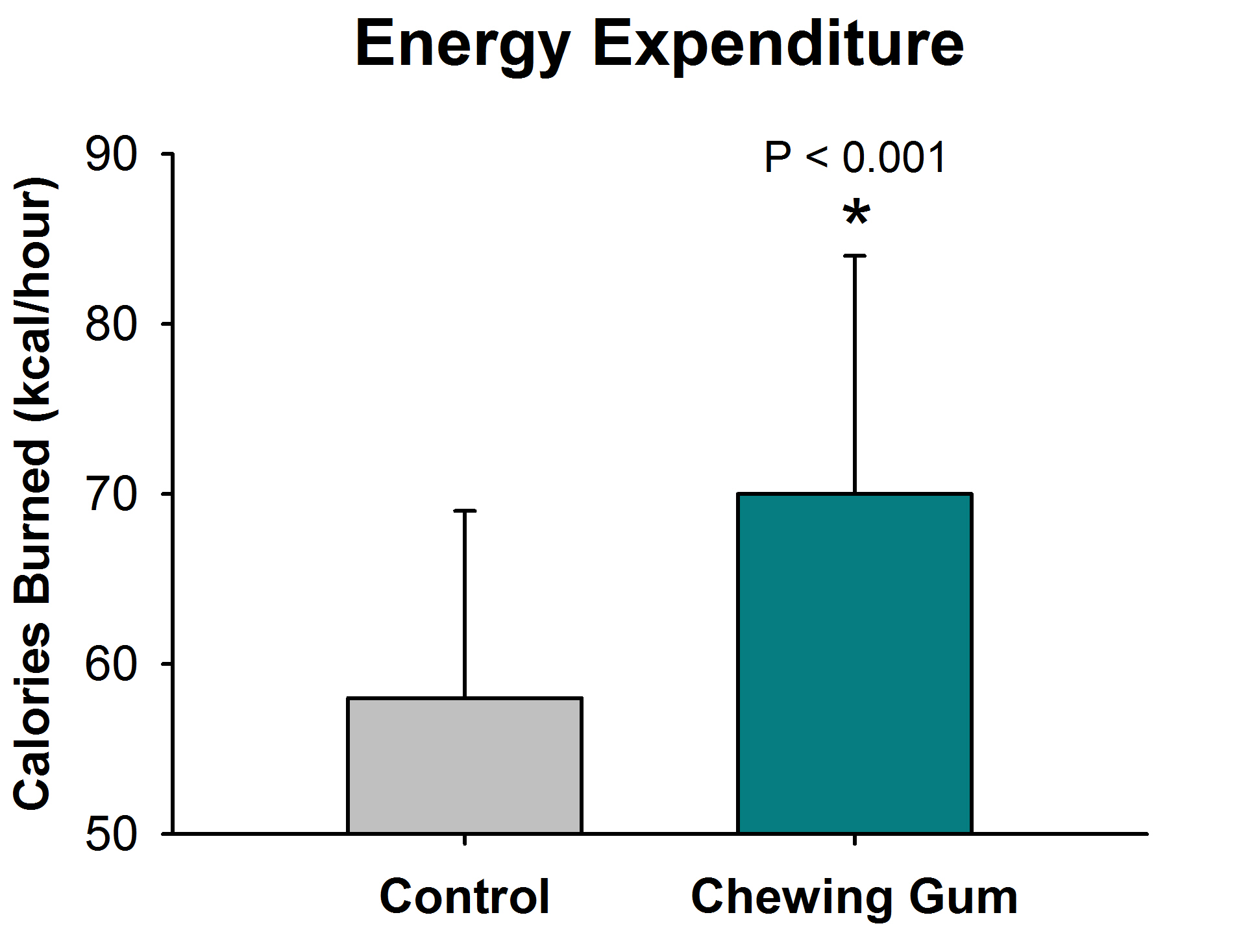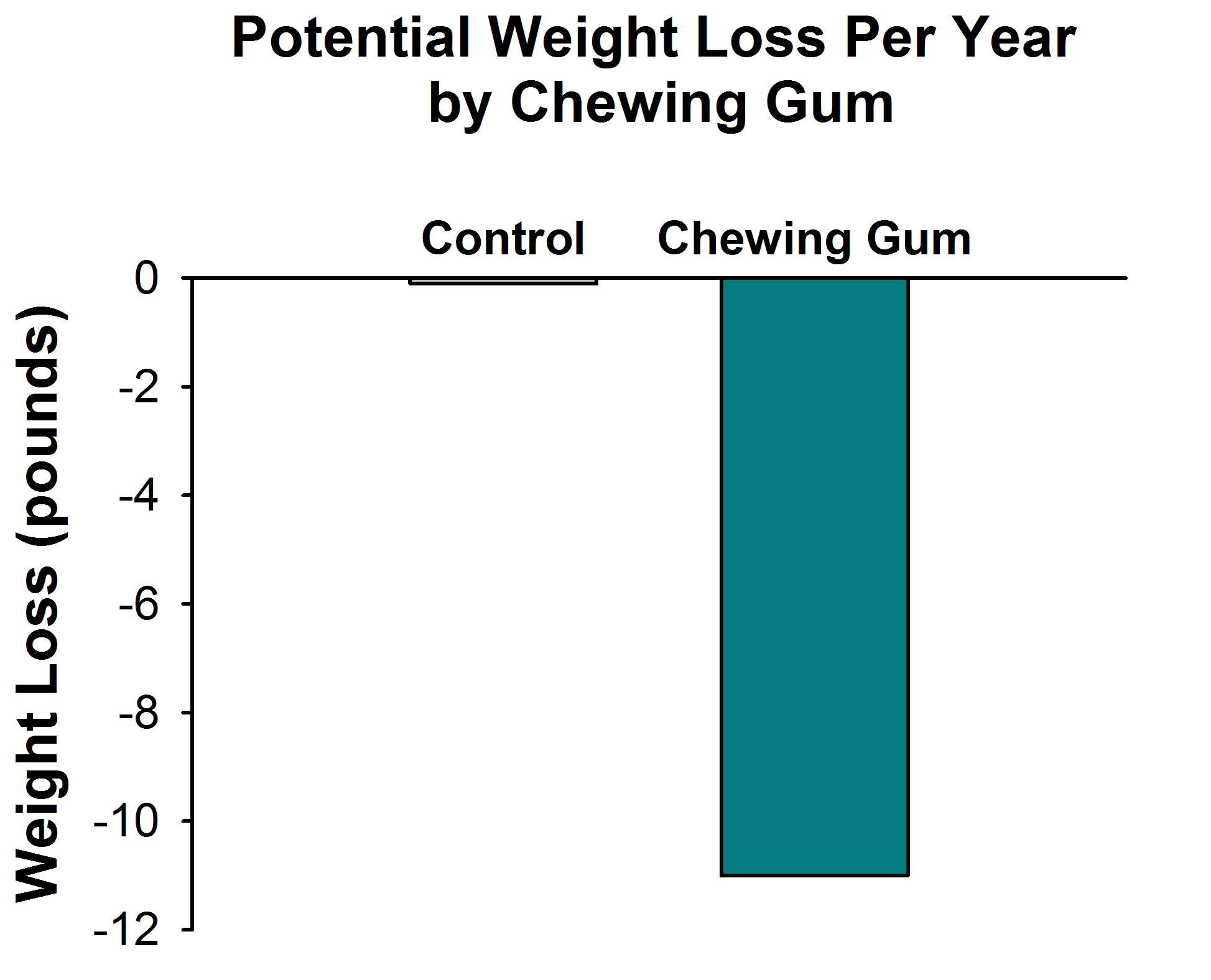Food, drink, and the act of chewing brings us a certain degree of comfort, pleasure, and satisfaction.
For millennia, people have utilized chewing (bark and/or tree sap) as a way to relieve hunger, freshen breath, and increase stamina. The pleasure and satisfaction achieved by chewing without eating food (also known as non-caloric chewing) is not unique to humans as it is also common across other species as noted by the famed primatologist, Jane Goodall.
In today’s obesogenic environment, our urge to chew has largely backfired. The comfort, pleasure, and satisfaction we once gained from non-caloric chewing has been replaced with snacking on high-calorie foods, which, over the course of time leads to weight gain.
There are numerous diets out there that cause people to lose weight, but eventually the majority of diets fail because people cannot maintain/adhere to them (Figure 1).
What people really need is a small change in behavior that burns calories and can be sustainable over the course of time....
Chewing Gum is Exactly That!
Chewing gum can help drop excess body weight by unlocking the natural processes of the body. For example, the act of chewing gum increases metabolic rate, uses energy to build enzymes, tricks our brains into thinking we are full, distracts us from eating real food, lowers stress, detoxifies waste buildup, and promotes weight loss. How does it do this? Read below to find out!
Figure 2. The Effects of Chewing Gum on Metabolic Rate. Chewing gum has been shown to increase metabolic rate by a whopping 19%.
In addition to boosting your metabolic rate, chewing gum may offset some of the diminished weight loss that occurs when you eat fewer calories during dieting. The process of digesting and absorbing the energy in the food you eat ((which is known as the thermic effect of food (TEF)) is an energetically expensive process. When people diet to lose weight, they eat less food. Eating less food results in a decrease in the TEF and acts to blunt additional weight loss. Chewing gum offsets the loss in the TEF. Proof of this comes from leading experts in the field of metabolism, which have suggested that humans can lose as much as 10 pounds per year, just by chewing gum.
Chewing gum may also help to offset the loss of the calories you would otherwise burn through the TEF without consuming unnecessary calories by increasing the production and secretion of enzymes (the proteins the body makes to break down nutrients in food you eat). To build enzymes, cells in the body must utilize energy (burn calories). Chewing gum also stimulates saliva production and secretion, which is also an energetically expensive process. Building enzymes and producing and secreting saliva reduces the loss of the TEF you would otherwise experience when you eat less food during dieting.
Chewing Gum Increases Enzyme Production and Starves “Bad”, Inflammation Producing Gut Bacteria: Over the past 30 years carbohydrate consumption has substantially increased in the United States (Figure 4). The enzyme in our saliva responsible for breaking down carbohydrates (salivary amylase) has not kept pace with the amount of carbohydrates we consume. The “bad” bacteria in our large intestines responsible for increasing inflammation feed on this excess in carbohydrate, leaving us metabolically and physically sick. Chewing gum increases the production of salivary amylase, reduces the amount of carbohydrate available to the “bad” bacteria of the gut, and therefore makes us metabolically and physically healthier (and reduces inflammation at the same time).
Chewing Gum Detoxifies Waste Build-Up: In addition to increasing the digestion of carbohydrates and starving the “bad” bacteria of the gut, chewing gum in the absence of food ingestion cleans out the digestive tract by allowing the enzymes produced during chewing to act on food particles that haven’t been fully absorbed or passed through your digestive tract as fecal matter. In other words, the digestive enzymes can now clean out the leftover food in your colon that was causing nutrient malabsorption and inflammation because the enzymes produced during chewing gum cleans out your digestive tract.
Chewing Gum Tricks Your Brain into Thinking You’re Full: Chewing stimulates the neurons that act on the satiety (fullness) center of our brain, the hypothalamus, through the gut-brain axis. Chewing gum tricks the brain into thinking there is food in our digestive tract and causes peristalsis (wave like muscle contractions that propel food through our intestines). In the clinical setting, when post-operative ileus patients were instructed to chew gum after surgery, the muscles in their intestines were contracting faster than the patients who were not chewing gum and this leads to greater levels of fullness.
Chewing Gum Distracts You from Eating Real Food: Not only does chewing gum increase energy expenditure, it reduces your intake of extra calories you might be tempted to eat in between meals. Have you tried eating food while chewing gum? It doesn’t work. It is not only difficult to chew gum and food simultaneously, but it is also highly unsatisfying to get crumbs mixed into the gum. Chewing gum acts as a distraction from eating real food similar to the way smoking deters people from eating (which is not recommended as a weight loss method).
Chewing Gum Lowers Your Stress and You Eat Less: Stress hormones, like cortisol, can influence your appetite and cause you to eat more and crave higher-fat and higher-sugar foods. To make matters worse, too much stress can cause the body to go into a catabolic state and actually break down calorie-burning muscles. Luckily for gum chewers, a recently published study showed that chewing gum alleviates stress. Scientists at the Collaborative Centre for the Study of Natural Medicines and Neurocognition in Australia found cortisol levels were reduced in subjects who chewed gum while under stressful situations compared to subjects who did not chew gum.
So far, thousands of people have used this system (started chewing gum throughout the day) and have seen amazing results! This is the next big trend in health and wellness because it’s easy, inexpensive, and it actually really works! If you’re tired of being let down by 30-day crash diets that eliminate your favorite food, then join the Gum Detox Movement. Don’t wait! You have calories to burn.
By the way, this is all a hoax.
This is exactly what millions of “pseudo-nutritionists” and even licensed health professionals disseminate into the worldwide web in order to start a following and profit from a phony claim (or multiple phony claims).
How do they do it? Just like this article, evidence is attributed to credible sources and is strung together to come up with a seemingly plausible argument. In writing this article, we turned legitimate nutrition science into quackery. We took advantage of our knowledge and status as trusted experts and abused it to entice those with vulnerabilities about weight, frustrations from low-self confidence, and a general lack of knowledge regarding the human body to buy into our utter nonsense.
Think this doesn’t really happen? It does. The take away message is and always has been: if it sounds too good to be true, it probably is. Don’t fall victim to nutrition miscommunication: follow us on social media for trusted health & wellness advice.
Our best,
Monica Salafia, dietetic intern
Todd M. Weber PhD, MS, RD



